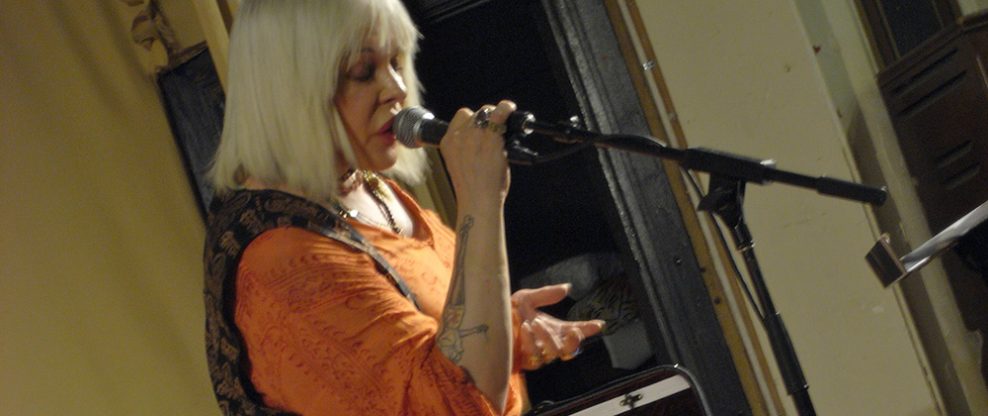NEW YORK (CelebrityAccess) — Genesis Breyer P-Orridge, the English singer-songwriter, poet, and performance artist who fronted groups such as Throbbing Gristle, and Psychic TV. has died. They were 70.
H/er death was announced in a statement from h/er daughters.
“It is with very heavy hearts that we announce the passing of our beloved father, Genesis Breyer P-Orridge,” Caresse and Genesse P-Orridge said in the statement. “S/he will be laid to rest h/er other half, Jaqueline “Lady Jaye” Breyer who left us in 2017, where they will be reunited.”
The announcement followed a somber Instagram post two days earlier in which Genesis posted an image of themselves, writing: “This is me today waiting to go home…”
According to media reports, P-Orridge died after a battle with leukemia.
Born in Manchester, England in 1950 as Neil Andrew Megson, P-Orridge developed an interest in both the occult and the avant-garde at an early age, forming a situationist performance art group the Knights of the Pentecostal Flame, which staged ‘happenings’ such as the “Beautiful Litter” campaign, catching the attention of local press.
S/he attended the private Solihull School in Warwickshire, where P-Orridge was influenced by authors such as William S. Burroughs, Jack Kerouac, and Aleister Crowley, as well as by music by artists such as The Fugs, Frank Zappa, and The Velvet Underground.
After leaving school, s/he relocated to London, where s/he joined the Transmedia Explorations commune. While h/er stay at the commune was brief, s/he later described it as a ‘seminal’ period for their development as an artist.
P-Orridge then returned to Hull where s/he helped to found COUM Transmissions, an avant-garde performance art and musical collective and began to stage concerts and performance art events that incorporated a wide range of instruments and improvisational techniques.
In 1971, s/he legally changed her name to Genesis P-Orridge, combining the aspirational word genesis with an altered spelling of porridge, a food that was frequently a sole source of nourishment during the artist’s early lean years.
1971 was also when the group first broke through to radio, appearing on the On Cue program for Radio Humberside, and later attracting the attention of famed British radio presented John Peel.
The group then relocated to London and received a subsidy from the Arts Council of Great Britain.
In 1975, P-Orridge was convicted with distributing obscene material via in the postal system under the 1953 Post Office Act after creating and mailing collages combining postcards of Queen Elizabeth with soft-core porn but the sentencing in the case, including jail time, was suspended on the condition that they discontinued the campaign.
That didn’t stop the members of COUM from continuing to court controversy. In 1976, they staged an exhibit on prostitution at the Institute of Contemporary Arts in London that included pornographic images, a stripper, transvestite guards, and prostitutes who mingled in the crowd with attendees.
The exhibition sparked debate in Parliament and resulted in the loss of the art grant for COUM, and core members of the group, including P-Orridge, as well ss Cosey Fanni Tutti, Chris Carter, and Peter “Sleazy” Christopherson, founded the industrial music and visual arts group Throbbing Gristle.
Their debut single “United / Zyklon B Zombie” and album The Second Annual Report, initially released independent, resonated with fans and was re-released via Mute Records, helping to define the sound that would later come to be known as industrial music.
Later music from the group, including their seminal album “20 Jazz Funk Greats” expanded on their sound, experimenting with everything from disco kitsch to synth-pop.
Despite their early success, the group disbanded in 1981 following a performance in San Francisco after a romance between Cosey Fanni Tutti and P-Orridge came to an end.
After the dissolution of Throbbing Gristle, P-Orridge and Scottish musician Alex Fergusson went on to found the experimental video art and music group Psychic TV as well as various splinter groups such as Splinter Test and later Thee Majesty, which experimented with spoken word and ambient music.
Throbbing Gristle reunited in 2004, releasing new music but Genesis P-Orridge dropped out mid-tour in 2010 over creative differences.
P-Orridge was a longtime proponent of discarding gender norms and began undergoing gender reassignment surgery in the mid-’00s.

































































